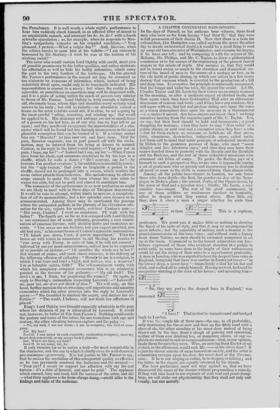A CHAPTER CONCERNING BASS-SINGING.
IN the days of Purcell, as his anthems bear witness, there lived men who were so far from having "lost their G," that they were
in full possession of their double D. Now that there is a taste for exhumation, (for Hampden was called up from the grave the other day to decide an historical doubt) it would be a good thing to rout up some old bass chaunter of Westminster, and examine his larynx, if he have any left; and by comparing it with the organs of Mr. Bellamy, Mr. Phillips, and Mr. C. Taylor, to draw a philosophical
conclusion as to the causes of the degeneracy of the present race of singers in the article of depth. Our surmise is, that they would not be found owing so much to the shrunken and diminished stature of the breed of men in the course of a century or two, as to the vile habit of public dining, by which our artists in a few hours destroy that vacuum which is essential to the production of a full and deep tone. In acoustics, the principle is universally recognized, that the longer and wider the tube, the graver the sound. Let Mr. Charles Taylor and Mr. Leete try their voices on an empty stomach in the morning, or after a moderate repast of chicken broth, and then again when they leave Goldsmiths' Hall after an aldermanic discussion of venison and turtle ; and if they have any candour, they will agree with us, that hot and profuse dining acts upon the voice as a warm atmosphere does upon the mercury in a thermometer e. makes it mount. Are bass-singers not to ea then ? we fancy ourselves hearing from the inquiring spirit of Mr. C. Taylor. Yes, we say, but their food should be light and farinaceous ; a yeast dumpling for instance, when they have to sing " Non nobis" at a public dinner, or cold veal and a cucumber when they have a solo —but let them eschew as ratsbane or hellebore all that green, fatty, oleaginous, destructive, indigestible mass, called turtle. Let them call to mind that noble principle of self-denial inculcated by Milton to the generous pursuer of fame, who must "scorn delights and live laborious days," and then they may have their names handed down to posterity with the Beards and the Randalls and the Eccleses, and the rest of those redoubted musicians who ornament old folios of songs. To prefer the fleeting joys of a haunch to such a prospect as this, we are sure is impossible among a set of gentlemen who so piously and ingenuously rise to disclaim all merit as soon as the cloth is removed from their dinner-table.
Among all the public bass-singers in London, we only know three who have depth—the first, the ponderous Jew of the Synagogue in Duke's-place ; the second, Porto, of the Opera-house, by the grace of God and a peculiar nose ; thirdly, Mr. Leete, a very amiable bass-singer. The rest of the gruff' community, by one of those artifices or weaknesses incident to humanity, affect to despise what they cannot attain. How little, say they, does it show a man a singer whether he ends thus
gentlemen. We grant you it makes little or nothing in showing the finish of his taste or style, and that it may be accompanied by great defects ; but the capability of making such a descent is the grand characteristic of the bass voice ; and without such a legacy from dame Nature, no man should be esteemed competent to set up in the trade. Commend us to the honest admiration our forefathers expressed of those who (without standing in a puddle to catch cold, as some have done in the height of their enthusiasm) could let out the string of their notes to a superhuman profundity. A man in London, who was reputed to have the deepest bass voice in England, being told that there was another in Exeter yet lower—" in the lowest deep, a lower deep "—immediately called for his hat and stick, and walked off' to satisfy himself. Having arrived, he found his competitor standing at the door of his house ; and accosting him—
" I have !" That instant he turned round and trudged back to London.
It was the simple life of these men—the one, in all probability, only moistening his throat now and then on the ddsty road with a glass of ale, the other standing at his street door instead of being drawn out by the legs from a Slough of gulosity and epicurism, neither of them ever drinking tea, or munching olives, or any sophisticate material to endear a copious libation—that, in our opinion, made them the men they were. Who, on arriving from Exeter at six o'clock in the afternoon, would seek Mr.— at his street door ? It is just the dinner minute of sonic benevolent society, and the artist is committing ravages upon his deer, his sweet-hart at the Freemasons'. If he is not singing or eating, he is sleeping or talking; and the latter, in the singer, are equally esteemed by his friends.
The bass performers must not urge against us, that we have discovered the cause of the disease without propoundinga remedy. If they will take heed to our regimen of cold veal and yeast-dumplings, we will stake our physimanship that they shall not only sink
vocally, but rise morally.


















 Previous page
Previous page